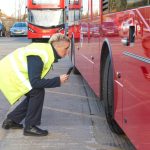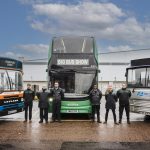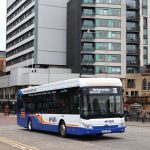routeone revisits Zeelo to see how far the business has come since it was launched two years ago, and its aim to work in partnership with the coach sector
Getting people out of their cars and onto public transport is one of the biggest hurdles the coach and bus sector is facing.
It’s a growing struggle that the industry has been seen to tackle head on by launching demand-responsive operations to rival the likes of Uber. However, operators are not alone with wanting to get more seats filled by those who use cars; there is another firm wanting to join forces in a bid to get more people onboard with using public transport on a regular basis, and that is Zeelo.
Zeelo joined the coach sector after Co-Founders Barney Williams and Sam Ryan sold their first business, JumpIn – a taxi booking and sharing app for students – to Addison Lee in 2014.
routeone met with Barney and Sam last year when the business was just a year old, now two years since its launch, we return to see how far the business has come.
Meet Zeelo
Meeting in its Shoreditch, London-based office, Sam explains that it’s important to understand Zeelo is not wanting to take customers away from an already-established operation, but rather team up together to enhance the service.
“We define ourselves as a shared transport service with a mission to move people out of cars and into shared transportation,” he says.
“Zeelo delivers that by building great relationships, in terms of technology and operational delivery, with coach operators all over the country.”
Working with Zeelo, operators can gain access to new markets as well as an opportunity to take on extra work. The firm is currently live in four key regions across the UK and has also expanded into South Africa where it is now live in three regions over there.
Why work with Zeelo?
Sam explains that the business has been out building daily commuter services and partnerships with companies. From that, it is then trying to give regular work to operators it works with.
“What we found is all over the country there are amazing family-run businesses that have been running from 10 years to over 70 years, and that’s for a good reason – because they are great at operating safe and reliable transport services, maintaining vehicles and drivers,” he says. “We need these amazing operators to work with partners to deliver great services.”
At the same time as forming partnerships, Zeelo is also launching new technology to help operators with this service.
“We want to work with the industry as opposed to disrupting it, and one way we are doing this is by starting to work on new routes in partnership with operators. “
The first operation that Zeelo are running is in partnership with south Wales-based Creigiau Travel running a commuter service from Newport to Bristol.
Sam says: “We are both actually sharing the risk and reward of that service. So Creigiau has added a couple of additional vehicles to its fleet and both parties are motivated to making a success of the service, which I think is a really interesting way to get everyone moving in the same direction.”
High standards
Currently Zeelo has what it calls its network of ‘preferred operator partners’ which stands at around 12 in the UK. These operators have gone through a certain level of vetting and now have regular work with it over a certain threshold. It also has a much wider pool of operators that its calls upon when it has less regular work.
“Generally, the standards we look for in operators are those that have a fleet of 20 upwards. We are looking for some variability in the fleet; having a fleet of full-size coaches is great, but actually we think there is a real need on the market for some small vehicles.

“Then when we dive into the actual operation and service itself, we look to make sure that operators have their own operations team. While we have our own live operations team overseeing the service, we also expect them to have the same. We also expect operators to have some form of driver training scheme in place.”
Future plans
“Our current focus is to give more to our current operators in the regions we already operate in through more commuting and better work,” Sam says.
Sam also says he would like the business to be in seven major regions across the UK by the end of the year as well as further expansion overseas and beyond South Africa.
“We are here in the industry, not trying to take an operators’ lunches, but trying to reinforce the contract to make sure they don’t lose them and also help them win even more with the aim of increasing their fleet utilisation and eventually – if they have aspirations to grow – their fleet size,” he adds.
“We are a really friendly and easy way to bring their business to a place where operators can gain access to new kinds of work.”






















